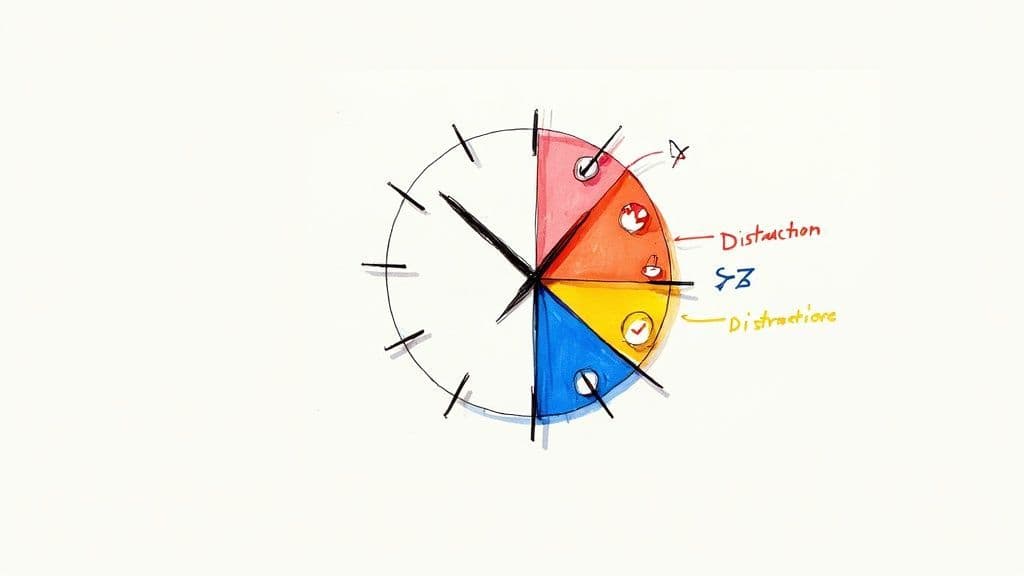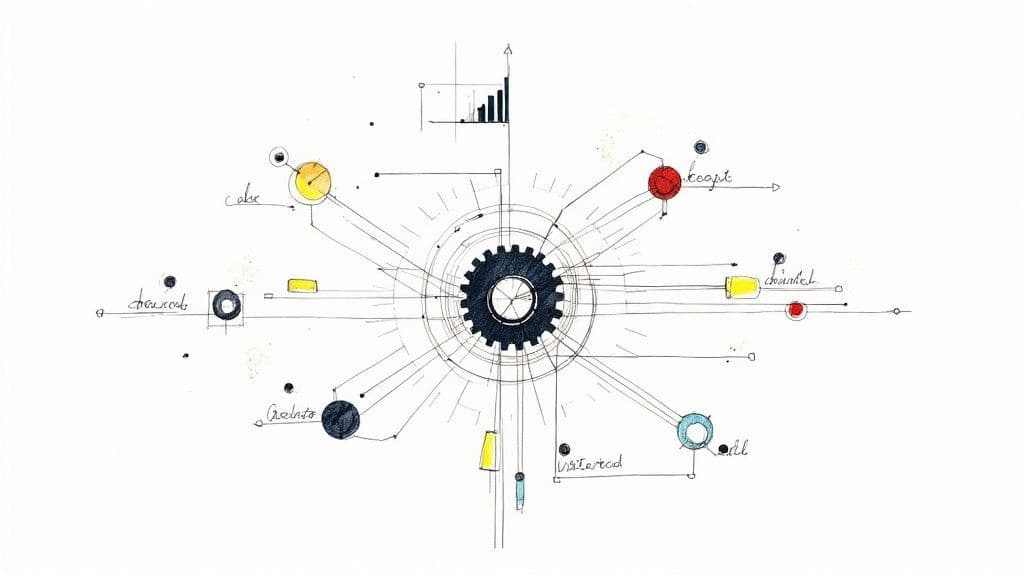8 Actionable Goals for Personal Development at Work in 2025
Explore our top 8 goals for personal development at work. Get actionable steps to enhance leadership, productivity, and communication for your career.

In today's dynamic workplace, simply completing tasks is no longer enough for long-term success. True career advancement stems from intentional growth, and setting clear goals for personal development at work is the difference between passively letting your career happen and actively steering it toward your desired destination. It's about building a skill set that not only meets current demands but also prepares you for future opportunities and challenges.
This roundup moves beyond generic advice to provide a curated list of eight powerful development goals. Each one is designed with actionable steps, real-world examples, and practical tips to help you cultivate the skills that truly matter. Whether you're aiming for a promotion, seeking greater job satisfaction, or future-proofing your career, this guide offers a clear roadmap. We will explore how to develop leadership, enhance communication, expand your network, and more.
To effectively track these ambitions and integrate them into your daily routine, a structured system is key. An AI-powered tool like Harmony AI can help you break down these large goals into manageable weekly tasks, set reminders, and monitor your progress, ensuring your development plan stays on track. This article will provide the strategic framework for your professional growth.
1. Developing Leadership Skills
Developing leadership skills is a foundational goal for personal development at work, extending far beyond traditional management roles. It’s about cultivating the ability to inspire, influence, and guide colleagues toward a shared objective. This involves a potent mix of emotional intelligence, strategic decision-making, clear communication, and the capacity to empower others. Whether you're an individual contributor or a team lead, these skills enable you to take ownership of projects, mentor peers, and drive meaningful change within your organization.

The impact is significant. Under Satya Nadella's growth-mindset leadership, Microsoft's market value soared by over $1 trillion. Similarly, Google's "Project Oxygen" found that teams led by managers exhibiting key leadership behaviors, like being a good coach and empowering the team, saw performance improve by up to 75%. These examples prove that effective leadership is a direct catalyst for organizational success and individual career advancement.
How to Implement This Goal
- Volunteer for Initiative: Start by leading a small, low-risk project or a cross-functional team meeting. This provides a safe environment to practice decision-making and delegation.
- Seek Constructive Feedback: Actively request 360-degree feedback from managers, peers, and direct reports to uncover blind spots in your leadership approach.
- Embrace Stretch Assignments: Take on tasks that push you beyond your current capabilities. This forces you to learn new skills, manage uncertainty, and build resilience.
- Practice Active Listening: Before making decisions, make a conscious effort to solicit and genuinely consider input from your team. This builds trust and fosters a collaborative environment.
For those committed to honing their leadership abilities, mapping out these steps is crucial. Platforms like Harmony AI can help you structure this journey, allowing you to set specific milestones-such as "Lead one team meeting per month"-and track your progress toward becoming a more effective leader. This approach transforms a broad ambition into a series of achievable, self-improvement goals.
2. Improving Time Management and Productivity
Improving time management is one of the most impactful goals for personal development at work because it's about reclaiming control over your most finite resource: time. This skill involves more than just being busy; it’s about organizing, planning, and executing tasks with intention to work smarter, not harder. By mastering prioritization, eliminating distractions, and adopting efficient systems, you can significantly enhance your output, reduce stress, and achieve a healthier work-life balance, proving your reliability and professionalism.

The results of superior time management are transformative. Toyota’s continuous improvement philosophy, "Kaizen," which heavily emphasizes time efficiency, led to productivity increases of 30-50%. Similarly, author Cal Newport’s concept of "Deep Work" has been adopted by professionals in demanding fields to double their valuable output without increasing hours. These examples demonstrate that mastering your schedule is a direct pathway to greater accomplishment and career growth.
How to Implement This Goal
- Identify Daily Priorities: Start each day by defining your top three "must-do" tasks. This focuses your energy on high-impact activities before distractions arise.
- Use Time-Blocking Techniques: Schedule specific blocks of time for your most important tasks, a method central to the Pomodoro Technique. For those juggling multiple responsibilities, exploring strategies for managing multiple projects effectively can be invaluable.
- Batch Similar Activities: Group related tasks, like answering emails or making calls, into a single session. This minimizes the mental "cost" of switching between different types of work.
- Audit Your Time: Track how you spend your hours for one week to identify time-wasting habits and opportunities for optimization. You can learn more about this by creating a structured daily planner.
To turn this goal into a reality, you need a system. Harmony AI can help you implement these strategies by setting clear, trackable objectives, such as "Complete three 25-minute Pomodoro sessions daily" or "Dedicate a 90-minute deep work block every morning." This structured approach helps transform the abstract goal of "better productivity" into a concrete, achievable daily practice.
3. Enhancing Communication Skills
Enhancing communication skills is a vital goal for personal development at work, as it underpins nearly every professional interaction. This goal involves mastering how you convey information, listen actively, and interpret non-verbal cues. Strong communicators can articulate complex ideas simply, navigate difficult conversations with empathy, and inspire action, making this a universally valuable skill set that reduces conflict and builds stronger, more effective teams.

The impact of elite communication is undeniable. In healthcare, the SBAR (Situation-Background-Assessment-Recommendation) communication protocol has been shown to reduce serious medical errors by up to 30%. Similarly, Buffer’s commitment to radical transparency in its communication helped it achieve employee engagement scores of 95%. To truly excel professionally, enhancing your communication skills is paramount, and you can find specific resources through effective communication skills training to achieve this. These examples highlight how intentional communication directly boosts efficiency, safety, and morale.
How to Implement This Goal
- Practice Active Listening: In your next meeting, focus on understanding the speaker’s perspective before formulating your response. Try paraphrasing their key points to confirm your understanding.
- Seek Specific Feedback: Ask a trusted manager or mentor, "How could I have communicated more clearly in that email?" or "What was your main takeaway from my presentation?"
- Study Effective Communicators: Analyze how leaders like Brené Brown or presenters in popular TED Talks structure their arguments and connect with their audience.
- Explain Complex Topics Simply: Challenge yourself to explain a technical aspect of your job to someone in a non-technical role. This practice sharpens your ability to distill information clearly.
To structure this development journey, you can use a tool like Harmony AI to set and track specific, measurable communication goals. You could create milestones such as "Ask for feedback on my communication style once per quarter" or "Lead one project update meeting without using filler words," turning a broad ambition into a concrete plan for professional growth.
4. Building Technical and Industry-Specific Expertise
One of the most impactful goals for personal development at work involves systematically acquiring and updating knowledge in specialized areas relevant to your field. This means mastering new software, learning programming languages, or deepening domain expertise. In today's rapidly evolving industries, continuous learning is not just an advantage; it's essential for remaining competitive and valuable. This goal is about proactively identifying skill gaps and staying current with industry trends to enhance your professional capabilities.

The return on this investment is clear and quantifiable. Studies show that IT professionals who earn an AWS certification can see salary increases of up to 20%. Similarly, digital marketers who master tools like Google Analytics and SEO best practices have been shown to increase campaign ROI by as much as 40%. These figures demonstrate that dedicating time to technical and industry-specific expertise directly translates into higher performance, better job opportunities, and increased earning potential.
How to Implement This Goal
- Identify High-Value Skills: Research job postings for roles you aspire to and identify the top three most requested technical skills or certifications. This ensures your learning is market-aligned.
- Allocate Dedicated Learning Time: Schedule 5-10 hours per week for focused study using platforms like Coursera, Pluralsight, or LinkedIn Learning. Consistency is key to making progress.
- Apply Knowledge Immediately: Find opportunities to use your new skills in current work projects. This practical application reinforces learning and showcases your growing capabilities.
- Pursue Recognized Certifications: Earn certifications from respected bodies like Google, AWS, or CompTIA to validate your expertise and make your resume stand out to employers.
To turn this aspiration into a structured plan, tools like Harmony AI can be invaluable. You can create a project dedicated to your technical growth, set specific milestones such as "Complete Google Analytics for Beginners course," and track your weekly learning hours. This transforms the broad objective of skill-building into a manageable and measurable journey toward career advancement.
5. Expanding Professional Network
Expanding your professional network is one of the most powerful goals for personal development at work, focusing on strategically building and maintaining relationships. It’s about more than just collecting contacts; it involves creating genuine connections with colleagues, industry peers, and mentors who can offer support, knowledge, and opportunities. A robust network serves as a powerful asset, providing access to unlisted job opportunities, critical industry insights, and career-defining collaborations. This goal is about systematically cultivating relationships both within and outside your organization.

The value of a strong network is undeniable. Reid Hoffman built LinkedIn on this very principle, creating a company valued at over $26 billion. According to research, up to 85% of all jobs are filled through networking, and professional association members report earning an average of 20% more than their non-member peers. These figures highlight a clear reality: your professional circle is a direct driver of career velocity and success, making networking a critical skill to master.
How to Implement This Goal
- Set a Clear Target: Aim to make two to three new, meaningful connections each month. Focus on quality over quantity by identifying people in roles or industries you admire.
- Practice the 'Give First' Mentality: Before asking for anything, offer value. Share a relevant article, make a helpful introduction, or provide feedback. This builds goodwill and establishes you as a valuable contact.
- Attend Strategic Events: Be selective about the industry conferences, workshops, and local meetups you attend. Go with the intention of meeting specific individuals or learning about particular trends.
- Maintain Your Connections: Schedule regular, low-effort check-ins like quarterly coffee chats or a quick email. Use a simple spreadsheet or CRM to track your interactions and remember key details about your contacts.
Building a network requires a structured approach. Using a tool like Harmony AI can help you manage this goal effectively. You can set specific, trackable milestones such as "Attend one industry event per quarter" or "Schedule three virtual coffee chats this month," turning the broad objective of networking into a manageable and measurable part of your professional development plan.
6. Developing Emotional Intelligence (EQ)
Developing emotional intelligence (EQ) is one of the most impactful goals for personal development at work. EQ is the ability to recognize, understand, and manage your own emotions while also perceiving and influencing the emotions of others. This skill set, encompassing self-awareness, empathy, and social skills, is a powerful determinant of success, often more so than raw intellect. In the workplace, high EQ translates to stronger relationships, more effective conflict resolution, and improved decision-making under pressure.
The business case for EQ is compelling. After implementing emotional intelligence screening for recruiters, the U.S. Air Force reduced turnover by a staggering 92%, saving millions. Similarly, Motorola's EQ training for managers led to a 50% reduction in workplace conflicts. These examples highlight that fostering EQ is not a soft skill but a strategic advantage that boosts collaboration, retention, and overall organizational health.
How to Implement This Goal
- Keep an Emotion Journal: Spend a few minutes each day noting your emotional responses to events. This practice builds self-awareness by helping you identify patterns and triggers.
- Practice the Pause: When faced with a stressful or emotionally charged situation, consciously pause before reacting. This small gap allows your rational mind to engage, preventing impulsive decisions.
- Seek Perceptual Feedback: Ask trusted colleagues or mentors how they perceive your emotional responses and communication style. This external perspective is invaluable for uncovering blind spots.
- Develop Active Empathy: In conversations, go beyond just listening to words. Try to understand the underlying emotions by asking questions like, "What might this person be feeling right now?"
Building EQ is a continuous process of reflection and practice. To make this one of your core goals for personal development at work, you can use tools like Harmony AI to set specific, measurable objectives. You could create tasks like "Practice the pause in one difficult conversation per week" or "Journal my emotional triggers daily" and track your progress, turning the abstract concept of EQ into a tangible development plan.
7. Taking Ownership and Initiative
Taking ownership and initiative is a transformative goal for personal development at work, marking the shift from a passive employee to a proactive contributor. It’s about accepting full responsibility for your work, outcomes, and professional growth without waiting for instructions. This mindset involves actively identifying problems, proposing solutions, and holding yourself accountable for results. Employees who demonstrate this level of commitment are consistently seen as reliable, innovative, and are often fast-tracked for leadership roles.
The power of this principle is evident across innovative companies. 3M's "15% Time" policy, which encourages employee-led projects, famously resulted in the invention of Post-it Notes. Similarly, Amazon's "Bias for Action" leadership principle empowers employees to make calculated decisions quickly, driving rapid innovation. These examples highlight how fostering a culture of ownership, as championed by thought leaders like Jocko Willink with "Extreme Ownership," directly fuels both individual career growth and organizational breakthroughs.
How to Implement This Goal
- Identify and Solve: Pinpoint a recurring problem within your team or department. Instead of just complaining, develop and present a clear, actionable solution to your manager.
- Volunteer Strategically: Step up for projects that are outside your immediate responsibilities but align with your career goals. This demonstrates ambition and a team-player attitude.
- Own Your Mistakes: When something goes wrong, address it head-on. Acknowledge your role, explain what you learned, and immediately pivot the conversation to the solution.
- Ask Proactive Questions: In meetings, consistently ask, "What can I do to move this forward?" This simple question signals your commitment to driving progress and taking an active role.
To effectively manage these new responsibilities, strong time management is essential. Efficiently managing an executive-level calendar becomes critical as you take on more. You can use platforms like Harmony AI to structure these initiatives as specific goals, such as "Propose one process improvement per quarter," and track your progress. This turns the abstract concept of ownership into a concrete, measurable plan for your professional development.
8. Achieving Work-Life Balance and Well-being
Achieving work-life balance is one of the most critical goals for personal development at work, as it directly fuels long-term productivity and career sustainability. This goal moves beyond simply managing time; it’s about managing your energy and establishing clear boundaries to protect your mental, physical, and emotional health. It recognizes that chronic stress and burnout are not badges of honor but significant barriers to high performance, creativity, and overall happiness. By prioritizing well-being, you create a sustainable model for professional success.
The tangible benefits are undeniable. When Microsoft Japan trialed a 4-day work week, productivity jumped by 40%. Similarly, LinkedIn's company-wide "RestUp" week led to a 30% reduction in employee burnout, and Patagonia’s family-supportive policies resulted in 100% retention of working mothers over a five-year period. These examples prove that integrating rest and personal life isn't a sacrifice of professional ambition; it's a strategic investment in it.
How to Implement This Goal
- Establish a "Hard Stop": Define a consistent end time for your workday and honor it. Physically shutting down your computer signals to your brain that it's time to disconnect.
- Schedule Self-Care: Block out time for exercise, hobbies, or relaxation on your calendar just as you would a business meeting. Treat these appointments as non-negotiable.
- Disable Notifications: Turn off all work-related alerts on your phone and computer during personal hours. This prevents the "always-on" mindset that leads to burnout.
- Take Your Full Vacation: Use all your allotted vacation days and make a conscious effort to truly disconnect from work. This allows for genuine recovery and mental reset.
For professionals committed to building a sustainable career, structuring these habits is essential. You can use platforms like Harmony AI to set specific, trackable goals-such as "Schedule three 30-minute breaks per week" or "Log off by 6 PM every day"-and monitor your consistency. This transforms the abstract idea of "balance" into a concrete plan for enhanced well-being and peak performance.
Personal Development Goals Comparison
| Item | Implementation Complexity 🔄 | Resource Requirements ⚡ | Expected Outcomes 📊 | Ideal Use Cases 💡 | Key Advantages ⭐ |
| Developing Leadership Skills | Moderate to High - requires time & practice 🔄🔄 | Medium - mentorship, training programs ⚡ | Improved influence, team productivity, career advancement 📊 | Aspiring leaders, managers, team drivers | Builds confidence, transferable management skills ⭐ |
| Improving Time Management and Productivity | Low to Moderate - habit formation 🔄 | Low - tools/apps, time investment ⚡ | Increased output, reduced stress, better work-life balance 📊 | Professionals needing efficiency and better focus | Reduces overwhelm, boosts reliability ⭐ |
| Enhancing Communication Skills | Moderate - ongoing practice 🔄 | Low to Medium - courses, feedback ⚡ | Fewer misunderstandings, stronger relationships, career growth 📊 | All roles requiring collaboration and influence | Enhances persuasiveness and team collaboration ⭐ |
| Building Technical and Industry-Specific Expertise | High - continuous learning, certifications 🔄🔄 | Medium to High - courses, certifications, time ⚡ | Increased job security, salary growth, expert reputation 📊 | Specialists, tech roles, rapidly evolving industries | High ROI, increases marketability ⭐ |
| Expanding Professional Network | Moderate - ongoing relationship building 🔄 | Low to Medium - events, platforms, time ⚡ | Access to opportunities, mentorship, increased visibility 📊 | Career growth, job seekers, entrepreneurs | Facilitates unadvertised opportunities ⭐ |
| Developing Emotional Intelligence (EQ) | Moderate to High - deep self-reflection 🔄🔄 | Low to Medium - coaching, assessments ⚡ | Better leadership, resilience, conflict management 📊 | Leaders, managers, roles demanding interpersonal skills | Predicts success better than IQ, builds trust ⭐ |
| Taking Ownership and Initiative | Moderate - mindset shift and habit building 🔄 | Low - self-driven, time investment ⚡ | Faster career progression, enhanced credibility 📊 | Fast-paced, startup environments, ambitious professionals | Accelerates promotion, builds entrepreneurial thinking ⭐ |
| Achieving Work-Life Balance and Well-being | Moderate - boundary setting & habit changes 🔄 | Low - lifestyle changes, time management ⚡ | Reduced burnout, sustained productivity, improved health 📊 | High-stress roles, long hours, those seeking balance | Enhances sustainability and satisfaction ⭐ |
Turn Your Goals into Reality with Harmony AI
Navigating the landscape of professional growth requires more than just ambition; it demands a clear strategy and consistent execution. Throughout this guide, we've explored a comprehensive set of goals for personal development at work, moving beyond generic advice to provide a blueprint for tangible advancement. From cultivating leadership and mastering time management to enhancing communication and expanding your network, each goal represents a powerful lever for career momentum.
We've seen how developing emotional intelligence can transform team dynamics, how taking initiative can redefine your role, and how building technical expertise can make you indispensable. The central theme connecting all these objectives is intentionality. True development doesn't happen by accident. It is the result of deliberate choices, strategic planning, and the discipline to follow through, day after day.
From Aspiration to Action
The journey from identifying your goals to achieving them is often where professionals falter. The demands of daily tasks, unexpected challenges, and the simple reality of a busy schedule can push your development goals to the back burner. This is a critical gap that needs to be bridged.
The key to sustained progress lies in creating a system that integrates your ambitions directly into your weekly and daily workflow. Your goals for personal development at work shouldn't be separate from your "real" work; they should be an integral part of it. This involves breaking down large objectives into manageable, actionable steps and scheduling them with the same priority as your most important meetings.
Key Takeaway: Personal development at work thrives on a foundation of proactive planning and consistent, small actions. It's about turning a vague desire for growth into a concrete, scheduled commitment.
A System for Sustained Growth
The ultimate value in mastering these goals extends far beyond a promotion or a pay raise. It’s about building a career that is not only successful but also fulfilling and resilient. By continuously honing your skills, you become more adaptable to industry changes, more effective in your collaborations, and more confident in your ability to lead and innovate. You are not just building a better employee; you are building a better version of yourself.
To support this journey, having the right tools is essential. Juggling your leadership training, networking events, technical courses, and personal well-being requires a sophisticated approach to planning. That's where Harmony AI shines. Unlike basic to-do lists, Harmony AI is your intelligent partner for professional development. It helps you define a personal mission, break down your goals into actionable weekly tasks, and automatically finds time in your calendar to complete them. It’s the only app that moves your development from a list of ideas to a concrete, daily practice.
Let this article be your starting point. Revisit the goals we’ve discussed, select one or two that resonate most deeply with your current career stage, and commit to taking the first small, actionable step today. Your future self will thank you for it.
Ready to turn your professional development goals into a reality? Harmony AI helps you define your mission and intelligently integrates your ambitions into your weekly schedule, ensuring your growth is never an afterthought. Start building a more intentional and fulfilling career today by downloading the app from Harmony AI.
Harmony - AI Planner & Goals App
Plan your weeks, plan your life. Define your mission, plan weeks around your roles, and stay on track every day with AI guidance.
Personal Mission
Define your deeper why with a mission statement
Role-Based Planning
Plan weeks around work, family, and personal growth
AI-Powered Guidance
Get goal suggestions and daily nudges to stay on track
Engaging Experience
Celebrate progress with confetti and stay motivated